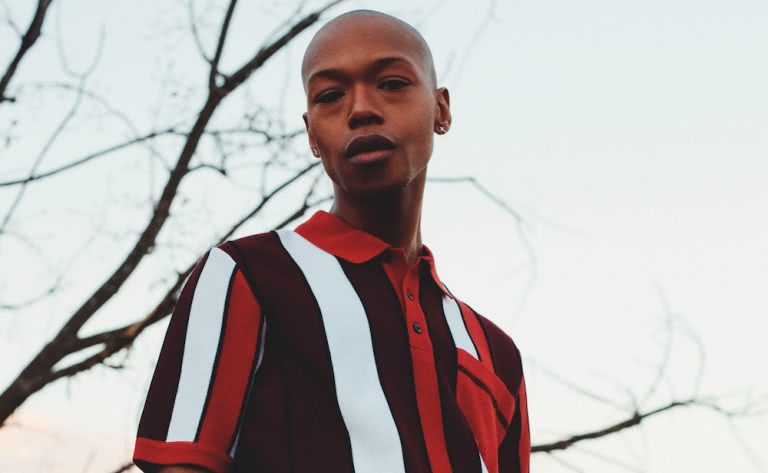The rising South African actor, novelist, and songwriter Nakhane Touré is in a state of welcomed fatigue. “It’s all been work,” he says of his time in Sydney to debut Inxeba (The Wound), a tense South African love story that saw the gay actor receive numerous death threats from members of the Xhosa tribe for its depiction of a private initiation into manhood. “I might actually skip the sights and just sleep. That’s all I want right now, but there’s work to be done.”
As we speak, Touré is tearing through paperwork for his label, BMG, in a Sydney café. “I’m not complaining, I really love being busy – it’s when I’m not busy that the troubles start.” Directed by South African John Trengove, the story at the heart of Inxeba is one that hits close to home for Touré.
A lot of the character’s surroundings are places that I thought that I’d left behind.
Within it, three men of the Xhosa tribe are forced to hide their sexuality while performing ulwaluko, a traditional circumcision ritual that resurfaced in the ’80s: it had been prohibited in 1820 when the tribe’s king lost multiple children to the procedure.
“Our customs and traditions have stopped being secret because it has turned into a hostile environment, an environment where people need to survive,” the film’s co-writer and Xhosa man Malusi Bengu told African news channel, ENCA. According to ulwaluko.co.za, an outlet dedicated to documenting the loss of life caused by the tradition, approximately 1077 young men have died from partaking in the rite of passage since 1995.
Touré’s Xolani is a factory worker who visits his married lover, Vija, in the mountains each year while he acts as a mentor to the initiates. For Touré, the most challenging aspect of playing the lead had more to do with location of the film. “A lot of the character’s surroundings are places that I thought that I’d left behind. And for various reasons, traumatic or not, I thought that I wouldn’t be in those surroundings ever again.
“So there was a level of triggering in there, and being surrounded by actively and performativity masculine men who I don’t spend a lot of time with because I find them exhausting. That performance of masculinity can be really tiring,” he says.
Watch a trailer for Inxeba below
The wound in question isn’t simply a reference to the cutting performed during ulwaluko; it is also symbolic for the limiting, self-degrading scripts that deny men access to their femininity, and to their attraction of other men – scripts that similarly exist in the West. “The film is a confrontation of what it means to be a man, specifically a Xhosa man,” wrote Niza Jay in Mail and Guardian, the actor who plays Kwanda, a Xhosa boy who was sent to rural mountains after his father felt he’d become too arrogant.
They say it takes 30 days for habits to form, so if you’ve been in the habit of being someone else for about 30 days it’s gotta stick.
Touré continues to divulge the challenges of working on the film. “Being someone else for five to six weeks is a challenge to the point where I’m not a half measure kind of person, you know. I came back home and my partner said that I walked differently. It can be a very dangerous thing.”
When questioned on the reasons for this danger, he explains, “Because when do you disengage? The people who are working behind the camera disengage as soon as the wrap party happens. The actors, if they are fully committed, take much longer to disengage because they’ve been those people for so long.
“They say it takes 30 days for habits to form. So if you’ve been in the habit of being someone else for about 30 days, it’s gotta stick.” That’s not to say he’s still performing Xolani’s habits. “Oh, God no. I’ve done a lot of work to make sure that guy’s behind me.”
Asked how Western media can do better when it comes to representing South Africa, he says, matter of fact, “Stop pretending you’re better! It’s as simple as that! I remember doing a lot of interviews when my album [You Will Not Die] came out earlier on this year, and there was a question like, ‘Do you feel safer now that you live in London?’ and I was like, ‘Fuck no!’ Queer people are afraid everywhere.’
“And why do you see South Africa as such a fearsome space? Yeah sure, we have violence, but we also have spaces that are extremely safe. And our institution is much more forward thinking than your constitution, actually. So yeah, there’s just this level of condescension,” he says.
Watch the clip for ‘Interloper’ by Nakhane below
Inxeba’s co-writers and cast all originated from the Xhosa tribe, meaning the story has authenticity, as opposed to white directors and writers who aren’t connected to its history and heritage. “Even if they are interested in the culture they’re not really interested in understanding it or how complex it is, right? They only take what they find attractive or unattractive, and then exclude the people who create the culture.”
Touré’s second record You Will Not Die is a soaring, soulful take on devotion, sexuality, and self-acceptance. He divulges on the writers who’ve inspired him – James Baldwin is his favourite – and stops mid-conversation to write off the word ‘creative’ as a title. “I know that artist may sound a little bit highfalutin. But my point is that being an artist means that have you committed to being an artist. It is as important a vocation as a priest or priestess or a doctor.”


































